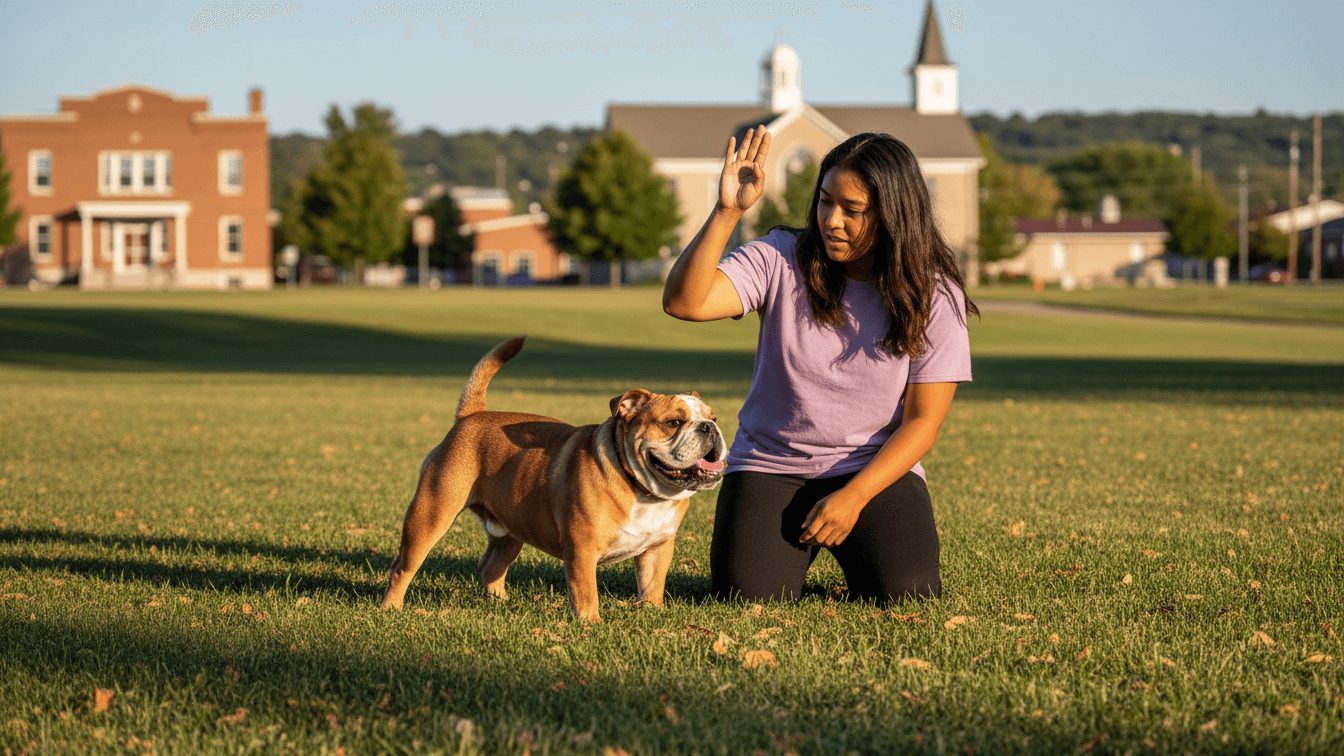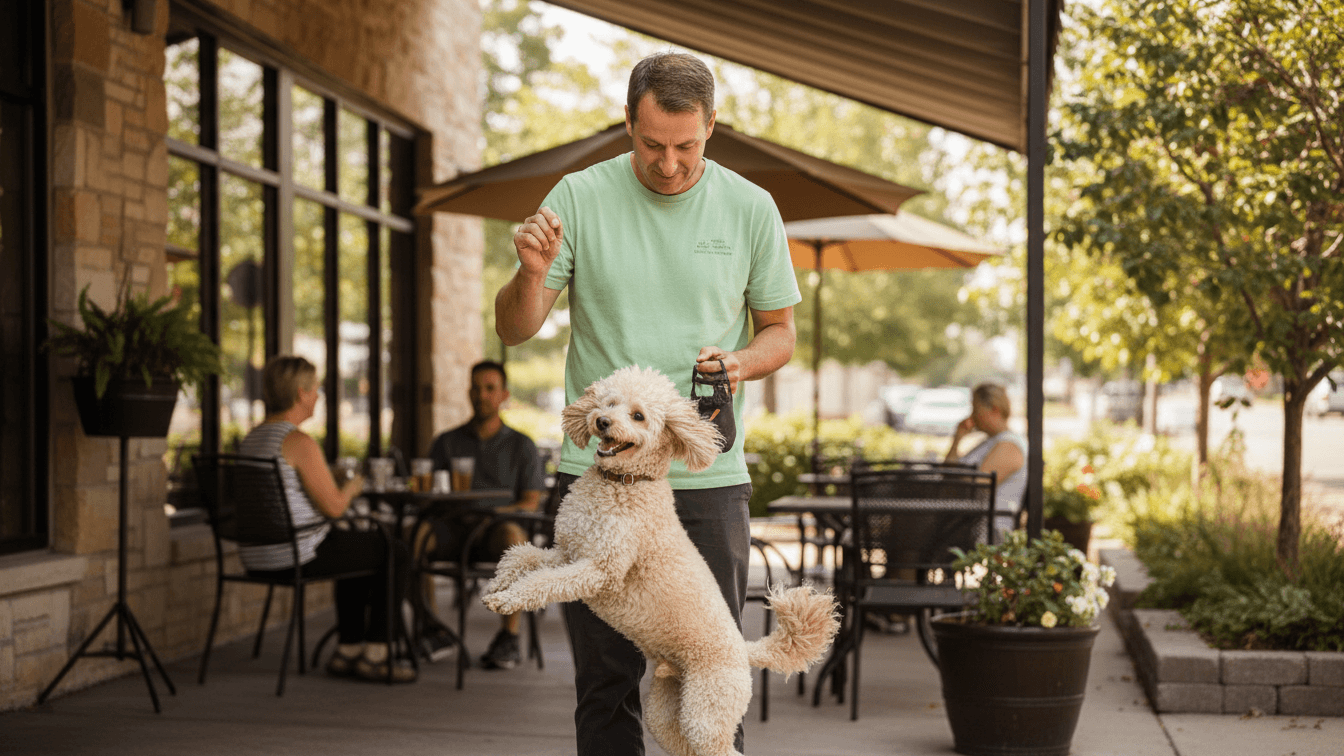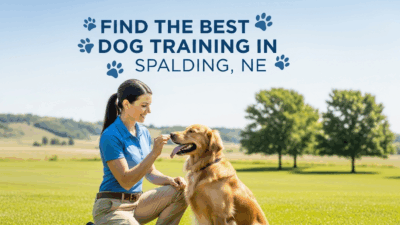Your Complete Guide to Choosing a Dog Trainer in Spalding and Surrounding Areas
Living in Spalding means your dog is part of a close-knit rural community where well-mannered pets are noticed and appreciated. Whether you’re walking down Main Street, visiting local businesses, or spending time at community events, a well-behaved dog makes life easier for everyone in a small town.
Since Spalding is in Greeley County, your dog training needs should account for both the rural lifestyle and the practical realities of living in a farming community. You’ll want a trainer who understands that dogs here might encounter livestock, wildlife, and wide-open spaces that create unique training challenges.
How to Choose the Right Trainer
Finding the right professional dog trainer starts with looking for someone who uses positive reinforcement training and understands rural Nebraska life. Your dog should learn reliable recalls for ranch property, calm behavior around livestock and farm equipment, and solid leash manners for town visits.
Credentials help you identify trainers with proven skills and ongoing education. Look for certifications like CPDT-KA, KPA-CTP, or CBCC-KA for serious behavior issues. For complex aggression or anxiety cases, trainers with IAABC-CDBC credentials bring specialized knowledge.
In-home dog training works especially well in rural areas because trainers can address problems right where they happen. They can help with farm-specific challenges like boundary training, livestock awareness, and vehicle safety around your property.
Group classes offer valuable socialization opportunities, but you may need to travel to larger towns nearby. Ask whether the training program includes practice in real-world settings that match your daily routine.
Common Dog Training Methods Explained

Reward-based methods create lasting behavior changes while building the trust you need when your dog has more freedom on rural property. These humane approaches also help you maintain good relationships with neighbors in a small community.
Basic obedience includes sit, down, stay, recall, and leash skills so your dog can handle trips to town, vet visits, and interactions with visitors without jumping or pulling. Strong recalls are especially important when dogs have access to larger properties.
Puppy training focuses on socialization, potty training, crate comfort, bite inhibition, and early leash work. Starting young helps prevent problems like chasing livestock or wandering off property.
Behavior modification addresses fear, reactivity, separation anxiety, and resource guarding through careful desensitization work. For dogs with aggression issues toward livestock or other animals, look for trainers experienced with these specific challenges.
Private lessons let you customize everything around your property layout and daily routines. Training sessions can happen in your yard, barn areas, or anywhere you need help.
Board and train programs can be helpful if you’re dealing with time constraints during busy farming seasons, but make sure the facility will teach you how to maintain the behaviors once your dog comes home.
Dog training classes and group settings help your dog practice calm behavior around other dogs and people. The best classes screen participants carefully and emphasize good manners over excitement.
Service dog training and therapy dog training require structured programs with clear public-access goals. These specialized paths need trainers who follow specific standards and testing requirements.
Skip any trainer who relies on fear, intimidation, or physical corrections. These methods damage trust and often create new behavior problems that are harder to fix later.
Average Cost of Dog Training in Spalding and Surrounding Areas (Updated for 2025)
Prices in Spalding and Greeley County typically run slightly lower than urban Nebraska rates, but travel fees can add up since most certified dog trainers are based in larger communities. Here’s what dog training services generally cost in 2025.
| Service Type | Average Cost (Greeley County Area) |
|---|---|
| Puppy classes (4-6 weeks) | $120-$225 total |
| Group obedience classes (4-6 weeks) | $130-$250 total |
| Private lessons (60-90 min) | $90-$160 per session |
| In-home training packages (4-6 visits) | $350-$750 total |
| Day training (weekly rate) | $400-$850 per week |
| Behavior consultation (initial) | $125-$200 |
| Board and train (2-4 weeks) | $1,800-$4,200 total |
Expert dog trainers often charge travel fees for distances outside their usual service area. Ask upfront about total costs, what’s included in packages, and whether a free consultation is available before you commit.
Make sure you understand how the trainer tracks progress and what you’re expected to practice between training sessions.
Questions to Ask a Potential Dog Trainer
- What training methods do you use, and how do you keep sessions positive and stress-free?
- What dog trainer certifications do you hold, and do you continue education through programs like CPDT-KSA?
- Have you worked with dogs in rural or farm settings, and do you understand livestock-related challenges?
- Do you offer in-home visits in Spalding and Greeley County, and what are your travel fees?
- How will you customize the training program for my dog’s specific needs and our rural lifestyle?
- What’s included in your pricing, and what’s your cancellation policy?
- Do you carry liability insurance, and can you provide proof?
- For behavior problems, will you coordinate with my veterinarian if needed?
- How do you measure progress, and when will we add more distractions?
- What should I practice between sessions to help my dog improve?
Local Spalding and Greeley County Considerations
Nebraska state law and local ordinances shape what dog owners need to know about keeping pets legally and safely. Understanding these rules helps you avoid problems with neighbors and local authorities.
Dogs must be under control at all times according to Nebraska law. While leash requirements vary by municipality, keeping your dog on leash in public areas is standard practice. Even in rural areas, unrestrained dogs can create liability issues if they wander onto neighboring property.
Nebraska requires current rabies vaccination for all dogs over three months old. You can get vaccinations through your local veterinarian or county clinics. The Nebraska Department of Health and Human Services oversees rabies control regulations statewide.
Greeley County doesn’t require general pet licensing, but keeping vaccination records current protects you legally and helps animal control reunite lost pets with owners.
Excessive barking can lead to nuisance complaints even in rural settings. Work with your trainer on alert barking and separation anxiety before issues escalate with neighbors.
Nebraska doesn’t regulate or license dog trainers at the state level. Anyone can call themselves a trainer, which makes checking credentials and methods even more important. Look for certified dog trainers with recognized credentials and positive reviews.
If a training facility boards dogs, they may need to follow kennel regulations through local zoning or health departments. Ask about facility licensing and insurance coverage.
Local Spalding and Surrounding Area Resources for Dog Owners
Spalding’s small size means formal dog parks are limited, but nearby communities and public lands offer opportunities for socialization and training practice.
Greeley County Courthouse lawn and other public spaces in town provide good locations for leash training when foot traffic is light. Always clean up after your dog and respect property boundaries.
For off-leash practice in safe, controlled environments, you’ll need to travel to larger communities. Many trainers recommend using private property with permission or fenced areas where you can work on recalls without distractions.
Local veterinary clinics in the area often know about informal meet-ups or training opportunities. Building a relationship with your vet also helps if behavioral issues have medical components.

FAQs
How much does in-home dog training cost?
Most trainers serving Greeley County charge $90-$160 per in-home visit, with travel fees added for distance. Package deals typically offer better value than single sessions.
Is in-home dog training worth it?
Absolutely, especially for rural properties where you need help with boundary training, livestock manners, and farm-specific challenges. Your trainer can address problems in the exact environment where they happen, whether that’s inside your home, around your yard, or near outbuildings.
Can you pay someone to house train your dog?
Yes, many trainers offer puppy training programs that include potty training guidance, crate training, and schedule development. Some offer day training where they work with your puppy during the day and teach you how to maintain progress.
What is the 3-3-3 rule for dog training?
This guideline helps new dog owners set realistic expectations: expect about 3 days for your dog to decompress, 3 weeks to learn household routines, and 3 months to feel fully settled. Good training programs work with this natural adjustment period rather than rushing results.
How long will it take to reach my training goals?
Most dogs show solid progress in basic obedience within 4-8 weeks with consistent daily practice. Behavior modification for issues like reactivity, aggression, or severe separation anxiety typically requires several months of gradual work.
What should I bring to group classes?
Pack a flat collar or harness, 6-foot leash, high-value treats your dog loves, water, and current vaccination records. Leave retractable leashes at home since they create safety risks in group settings.
What’s the leash law in Spalding?
Nebraska law requires dogs to be under control at all times. While Spalding doesn’t have published municipal codes readily available online, standard practice throughout rural Nebraska includes leashing dogs in public areas and keeping them from running at large. Check with the Greeley County Sheriff's office for specific local requirements.
Do I need a dog license in Spalding or Greeley County?
Greeley County doesn’t require general dog licenses, but Nebraska state law requires current rabies vaccination for all dogs over three months old. Keep vaccination tags on your dog’s collar and records accessible.
What shots does my dog need in Greeley County or Nebraska?
Rabies vaccination is required by Nebraska law. Your veterinarian may recommend additional vaccines like distemper-parvo combination and bordetella based on your dog’s exposure risks and lifestyle. Consult your local vet for personalized recommendations.
Are dog trainers required to be licensed in Spalding or Greeley County or Nebraska?
No, Nebraska doesn’t require licensing or certification for dog trainers. This makes it important to ask about credentials, methods, insurance, and experience when choosing a trainer. Look for nationally recognized certifications that require testing and continuing education.
Where can I practice off-leash recall?
Since Spalding doesn’t have formal dog parks, use securely fenced private property with permission. For socialization opportunities, you may need to travel to larger communities that have designated off-leash areas. Always ensure your dog has reliable recall before practicing in unfenced spaces.
Which dog parks allow training around Spalding?
Spalding doesn’t have formal dog parks within town limits. The nearest designated dog parks are typically in larger Nebraska communities like Grand Island, Kearney, or North Platte. These locations offer fenced areas where you can practice socialization and obedience training safely.
What trails allow dogs for training?
Public lands around Greeley County often allow leashed dogs on trails and open spaces. Check specific regulations before visiting state wildlife management areas or public hunting grounds. These locations can be excellent for building focus around wildlife and practicing recalls in controlled situations, but always respect posted rules and seasonal restrictions.
How do I help my dog with livestock training?
Working with a professional trainer experienced in rural settings is crucial for teaching dogs to respect livestock boundaries. Start with basic obedience and impulse control, then gradually introduce your dog to farm animals under careful supervision. Never allow unsupervised access until your dog has proven reliability, and remember that prey drive can be strong even in well-trained dogs.
What if my dog has separation anxiety on a rural property?
Separation anxiety can be more challenging in rural settings where dogs have more space and fewer consistent routines. Work with a trainer experienced in behavior modification to build independence gradually. Start with short absences and use positive reinforcement to reward calm behavior when you return.
The right combination of humane methods, consistent practice, and realistic expectations will help your dog become a reliable companion whether you’re working on the farm or visiting town. Taking time to find a qualified trainer who understands rural Nebraska life will pay off in years of good behavior and a stronger bond with your dog.
